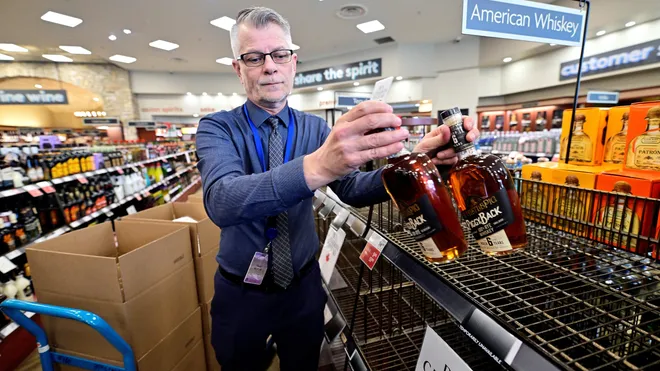President Donald Trump has threatened to impose a staggering 200% tariff on European wines and other alcoholic beverages, dramatically escalating the ongoing trade dispute between the United States and the European Union. This move comes in direct response to the EU’s recent implementation of a 50% tariff on American whiskey, which Trump labeled as “nasty”.
In a strongly worded message on Truth Social, Trump characterized the EU as “one of the most hostile and abusive taxing and tariffing authorities in the World,” asserting that it was “created solely to exploit the United States”. He demanded the immediate removal of the EU’s whiskey tariff, warning that failure to comply would result in the U.S. swiftly applying a 200% tariff on “all WINES, CHAMPAGNES, & ALCOHOLIC PRODUCTS COMING OUT OF FRANCE AND OTHER E.U. REPRESENTED COUNTRIES”.
This potential tariff hike could have far-reaching implications for the global spirits industry. The United States remains the world’s largest import market for both wine and champagne, with annual sales of $4.9 billion and $1.7 billion respectively. European alcohol producers, particularly those in France, Italy, and Spain, could face significant challenges if these tariffs are implemented.
Major European spirits conglomerates are likely to feel the impact. LVMH Moët Hennessy Louis Vuitton SE (EPA: MC), the French multinational luxury goods company, owns several prestigious champagne and wine brands that could be affected. Similarly, Pernod Ricard SA (EPA: RI), another French company with a global portfolio of spirits and wines, may also face headwinds.
Pernod Ricard’s stock, trading under the symbol “RI” on the Euronext Paris exchange, has already shown signs of volatility. As of March 6, 2025, it was trading at €104.10, having experienced an almost 31% decline over the past 12 months. The threat of additional tariffs could further pressure the company’s stock price and financial performance.
The potential tariffs have also raised concerns among U.S. industry players. While Trump claimed the move would be “great for the Wine and Champagne businesses in the U.S.,” the reality may be more complex. U.S. wine exports, currently ranking fifth globally at about $1 billion, could face retaliatory measures from the EU, potentially harming American producers.
As tensions escalate, diplomatic efforts are underway to defuse the situation. A spokesperson for the European Commission stated that the region’s trade minister has already contacted American counterparts, and further discussions are being arranged.
The threatened tariffs are part of a broader pattern of trade disputes between the U.S. and EU. Earlier this month, Trump increased tariffs on Chinese imports to a minimum of 20% and has warned of potential tariffs on various other products, including copper, lumber, and automobiles.
As the situation unfolds, investors and industry stakeholders are closely monitoring developments. The potential implementation of these tariffs could reshape the global spirits market, affecting everything from consumer prices to corporate strategies and international trade relations. This trade dispute adds another layer of uncertainty to an already complex global economic landscape. As both sides continue their negotiations, the spirits industry braces for potential disruptions and seeks ways to navigate this challenging environment.

